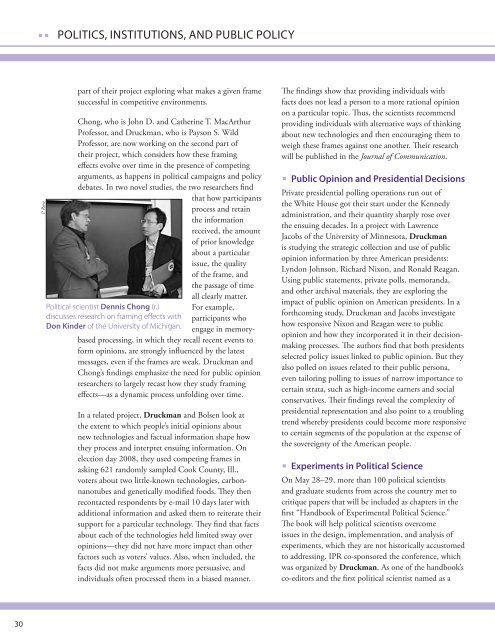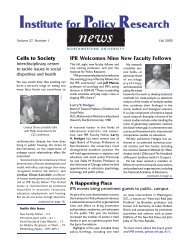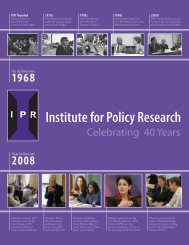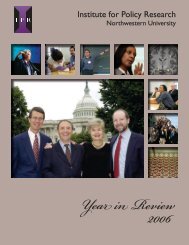Overview of Activities - Institute for Policy Research - Northwestern ...
Overview of Activities - Institute for Policy Research - Northwestern ...
Overview of Activities - Institute for Policy Research - Northwestern ...
You also want an ePaper? Increase the reach of your titles
YUMPU automatically turns print PDFs into web optimized ePapers that Google loves.
P. Reese<br />
P. Reese<br />
POLITICS, INSTITUTIONS, AND PUBLIC POLICY<br />
IPR 2009<br />
part <strong>of</strong> their project exploring what makes a given frame<br />
successful in competitive environments.<br />
Chong, who is John D. and Catherine T. MacArthur<br />
Pr<strong>of</strong>essor, and Druckman, who is Payson S. Wild<br />
Pr<strong>of</strong>essor, are now working on the second part <strong>of</strong><br />
their project, which considers how these framing<br />
effects evolve over time in the presence <strong>of</strong> competing<br />
arguments, as happens in political campaigns and policy<br />
debates. In two novel studies, the two researchers find<br />
that how participants<br />
process and retain<br />
the in<strong>for</strong>mation<br />
received, the amount<br />
<strong>of</strong> prior knowledge<br />
about a particular<br />
issue, the quality<br />
<strong>of</strong> the frame, and<br />
the passage <strong>of</strong> time<br />
all clearly matter.<br />
Political scientist Dennis Chong (r.) For example,<br />
discusses research on framing effects with participants who<br />
Don Kinder <strong>of</strong> the University <strong>of</strong> Michigan. engage in memorybased<br />
processing, in which they recall recent events to<br />
<strong>for</strong>m opinions, are strongly influenced by the latest<br />
messages, even if the frames are weak. Druckman and<br />
Chong’s findings emphasize the need <strong>for</strong> public opinion<br />
researchers to largely recast how they study framing<br />
effects—as a dynamic process unfolding over time.<br />
In a related project, Druckman and Bolsen look at<br />
the extent to which people’s initial opinions about<br />
new technologies and factual in<strong>for</strong>mation shape how<br />
they process and interpret ensuing in<strong>for</strong>mation. On<br />
election day 2008, they used competing frames in<br />
asking 621 randomly sampled Cook County, Ill.,<br />
voters about two little-known technologies, carbonnanotubes<br />
and genetically modified foods. They then<br />
recontacted respondents by e-mail 10 days later with<br />
additional in<strong>for</strong>mation and asked them to reiterate their<br />
support <strong>for</strong> a particular technology. They find that facts<br />
about each <strong>of</strong> the technologies held limited sway over<br />
opinions—they did not have more impact than other<br />
factors such as voters’ values. Also, when included, the<br />
facts did not make arguments more persuasive, and<br />
individuals <strong>of</strong>ten processed them in a biased manner.<br />
The findings show that providing individuals with<br />
facts does not lead a person to a more rational opinion<br />
on a particular topic. Thus, the scientists recommend<br />
providing individuals with alternative ways <strong>of</strong> thinking<br />
about new technologies and then encouraging them to<br />
weigh these frames against one another. Their research<br />
will be published in the Journal <strong>of</strong> Communication.<br />
< Public Opinion and Presidential Decisions<br />
Private presidential polling operations run out <strong>of</strong><br />
the White House got their start under the Kennedy<br />
administration, and their quantity sharply rose over<br />
the ensuing decades. In a project with Lawrence<br />
Jacobs <strong>of</strong> the University <strong>of</strong> Minnesota, Druckman<br />
is studying the strategic collection and use <strong>of</strong> public<br />
opinion in<strong>for</strong>mation by three American presidents:<br />
Lyndon Johnson, Richard Nixon, and Ronald Reagan.<br />
Using public statements, private polls, memoranda,<br />
and other archival materials, they are exploring the<br />
impact <strong>of</strong> public opinion on American presidents. In a<br />
<strong>for</strong>thcoming study, Druckman and Jacobs investigate<br />
how responsive Nixon and Reagan were to public<br />
opinion and how they incorporated it in their decisionmaking<br />
processes. The authors find that both presidents<br />
selected policy issues linked to public opinion. But they<br />
also polled on issues related to their public persona,<br />
even tailoring polling to issues <strong>of</strong> narrow importance to<br />
certain strata, such as high-income earners and social<br />
conservatives. Their findings reveal the complexity <strong>of</strong><br />
presidential representation and also point to a troubling<br />
trend whereby presidents could become more responsive<br />
to certain segments <strong>of</strong> the population at the expense <strong>of</strong><br />
the sovereignty <strong>of</strong> the American people.<br />
< Experiments in Political Science<br />
On May 28–29, more than 100 political scientists<br />
and graduate students from across the country met to<br />
critique papers that will be included as chapters in the<br />
first “Handbook <strong>of</strong> Experimental Political Science.”<br />
The book will help political scientists overcome<br />
issues in the design, implementation, and analysis <strong>of</strong><br />
experiments, which they are not historically accustomed<br />
to addressing. IPR co-sponsored the conference, which<br />
was organized by Druckman. As one <strong>of</strong> the handbook’s<br />
co-editors and the first political scientist named as a<br />
lead editor <strong>of</strong> Public Opinion Quarterly, he is leading the<br />
charge to improve methodology in the field.<br />
The conference was held at <strong>Northwestern</strong>—home to the<br />
“father <strong>of</strong> quasi-experimentation,” Donald Campbell,<br />
<strong>for</strong> many years—and welcomed other experimental<br />
methods pioneers, such as Shanto Iyengar and Paul<br />
Sniderman <strong>of</strong> Stan<strong>for</strong>d University, Alan Gerber and<br />
Donald Green <strong>of</strong> Yale University, and Diana Mutz <strong>of</strong><br />
the University <strong>of</strong> Pennsylvania. The National Science<br />
Foundation is providing support <strong>for</strong> the project, and<br />
Cambridge University Press is slated to publish the<br />
handbook in 2011.<br />
< American Attitudes on Income Inequality<br />
The American Dream has come to typify American<br />
beliefs about economic opportunity and inequality—<br />
that if you work hard you will get ahead. But research<br />
by sociologist Leslie McCall paints a more complex<br />
picture. She points to a need <strong>for</strong> other ways to describe<br />
opportunity than just “hard work gets you ahead.”<br />
Using General Social Survey (GSS) data, she has<br />
identified five ways in which Americans think about<br />
economic opportunity. This research is part <strong>of</strong> her<br />
book manuscript, tentatively titled “The Undeserving<br />
Rich.” McCall is finding that while Americans clearly<br />
want a more equal society, the perceived lack <strong>of</strong> viable<br />
alternatives pushes them to<br />
desire wider opportunities<br />
in the <strong>for</strong>m <strong>of</strong> educational<br />
attainment and economic<br />
growth as the best means to<br />
the end. The book will expand<br />
on perceptions <strong>of</strong> inequality<br />
by examining the “undeserving<br />
rich,” looking at how processes<br />
<strong>of</strong> social distribution are barriers<br />
to opportunity, and situating<br />
American norms <strong>of</strong> equity in<br />
historical contexts.<br />
McCall also published a paper<br />
in Perspectives on Politics that<br />
looks at the impact <strong>of</strong> rising income inequality on social<br />
policy <strong>for</strong>mation. Using GSS and International Social<br />
Political scientist Benjamin Page (r.) and IPR<br />
graduate research assistants Toby Bolsen<br />
and Meredith Bintz Czaplewski participate<br />
in a panel on social networks and voting.<br />
Survey Programme data from the 1980s and 1990s, she<br />
and co-author Lane Kenworthy <strong>of</strong> the University <strong>of</strong><br />
Arizona contradict two widespread beliefs about how<br />
Americans perceive inequality and ef<strong>for</strong>ts to address it.<br />
Their research indicates that Americans generally object<br />
to rising inequality and believe that government should<br />
take steps to tackle it—though not through traditional<br />
rich-to-poor income transfer policies. McCall and<br />
Kenworthy suggest that increased support <strong>for</strong> education<br />
spending is a way <strong>for</strong> Americans to respond to growing<br />
concerns that inequality restricts opportunity. They<br />
also suggest this support might be driven by a lack <strong>of</strong><br />
cohesive solutions to—and spotty media coverage <strong>of</strong>—<br />
this complicated issue.<br />
< Politics and America’s Wealthiest Citizens<br />
Political scientist Benjamin Page is leading a new<br />
project that will survey the political attitudes and<br />
behavior <strong>of</strong> America’s wealthiest citizens, specifically<br />
those with incomes in the top 0.1 percent. Working<br />
with social scientists such as IPR’s Thomas D. Cook,<br />
Harvard’s Sandy Jencks, Princeton’s Larry Bartels, and<br />
Minnesota’s Lawrence Jacobs, Page will weave together<br />
data from a variety <strong>of</strong> sources, including NORC,<br />
R.R. Donnelly, and the GSS. Eventually they will<br />
paint the first national picture <strong>of</strong> America’s wealthiest<br />
citizens and their political views—which have never<br />
been comprehensively studied<br />
despite their enormous political<br />
influence. The survey seeks<br />
to answer two fundamental<br />
questions: To what extent are<br />
affluent Americans concerned <strong>for</strong><br />
the common good, and how do<br />
they engage it? The survey will<br />
explore their civic engagement<br />
and charitable activities; political<br />
participation; perceptions <strong>of</strong><br />
national problems; beliefs about<br />
markets, government, equal<br />
opportunity, and the American<br />
Dream; and policy preferences<br />
on issues ranging from jobs,<br />
healthcare, poverty, education, pensions, and taxes, to<br />
financial re<strong>for</strong>m and macroeconomic policy.<br />
30<br />
31
















